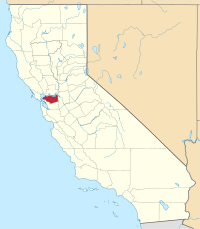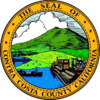Contra Costa County
| Contra Costa County | ||
|---|---|---|
| County | ||

The west face of Mount Diablo, the most notable natural landmark in Contra Costa County
|
||
|
||
 Location in the state of California |
||
 California's location in the United States |
||
| Country |
|
|
| State |
|
|
| Region | San Francisco Bay Area | |
| Incorporated | February 18, 1850 | |
| Named for | "Opposite coast" (Spanish: Contra costa) of the San Francisco Bay | |
| County seat | Martinez | |
| Largest city |
Concord (population) Richmond (area) |
|
| Area | ||
| • Total | 804 sq mi (2,080 km2) | |
| • Land | 723 sq mi (1,870 km2) | |
| • Water | 81 sq mi (210 km2) | |
| Highest elevation | 3,852 ft (1,174 m) | |
| Population (April 1, 2010) | ||
| • Total | 1,049,025 | |
| • Estimate (2015) | 1,126,745 | |
| • Density | 1,300/sq mi (500/km2) | |
| Time zone | Pacific Time Zone (UTC-8) | |
| • Summer (DST) | Pacific Daylight Time (UTC-7) | |
| Area code | 510, 925 | |
| FIPS code | 06-013 | |
| GNIS feature ID | 1675903 | |
| Website | www |
|
Contra Costa County is a county in the state of California in the United States. As of the 2010 census, the population was 1,049,025. The county seat is Martinez. The name is Spanish for "opposite coast", referring to its position on the other side of the bay from San Francisco. Contra Costa County is included in the San Francisco–Oakland–Hayward, CA Metropolitan Statistical Area, CA Metropolitan Statistical Area. It occupies the northern portion of the East Bay region and is primarily suburban.
In prehistoric times, particularly the Miocene epoch, portions of the landforms now in the area (then marshy and grassy savanna) were populated by a wide range of now extinct mammals, known in modern times by the fossil remains excavated in the southern part of the county. In the northern part of the county, significant coal and sand deposits were formed in even earlier geologic eras. Other areas of the county have ridges exposing ancient but intact (not fossilized) seashells, embedded in sandstone layers alternating with limestone. Layers of volcanic ash ejected from geologically recent but now extinct volcanoes, compacted and now tilted by compressive forces, may be seen at the site of some road excavations. This county is an agglomeration of several distinct geologic terranes, as is most of the greater San Francisco Bay Area, which is one of the most geologically complex regions in the world. The great local mountain Mount Diablo has been formed and continues to be elevated by compressive forces resulting from the action of plate tectonics and at its upper reaches presents ancient seabed rocks scraped from distant oceanic sedimentation locations and accumulated and lifted by these great forces. Younger deposits at middle altitudes include pillow lavas, the product of undersea volcanic eruptions.
...
Wikipedia

